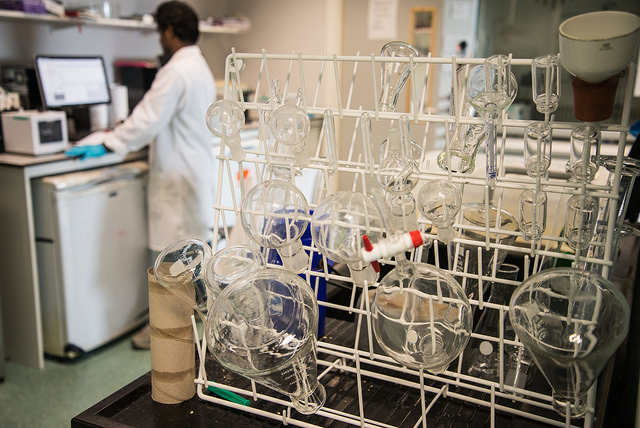Trinity researchers have narrowed the search for a “holy grail” catalyst for the decomposition of water – a process that has the potential to provide a renewable source of hydrogen energy.
School of Chemistry Professor Max García-Melchor and PhD candidate Michael Craig today published a paper in the Cell Reports Physical Science journal documenting their screening of 444 potential catalysts, which they narrowed down to nine.
As hydrogen’s energy-rich bond can be broken to produce only water, the molecule is considered to be a potential solution to the climate crisis. However, without a catalyst to increase the efficiency of hydrogen production, the use of the molecule in energy generation is not currently economically viable.
The researchers found nine, predominantly chromium-based, complexes, which are relatively inexpensive with low overpotentials.
Overpotential, which is directly related to the efficiency of an electrochemical reaction, describes the difference between the theoretical and experimental voltage required for the reaction to take place.
Catalysts with low overpotentials therefore require relatively little energy to split the water molecule, and if renewable energy is sourced for the process, it could allow for a sustainable means of producing hydrogen.
However, hydrogen gas does not occur naturally on Earth and must first be produced in order to benefit from the energy source. The decomposition of water is one method of producing hydrogen, but without a catalyst is an energy-intensive process.
Catalysts with the ability to efficiently split the water molecule have already been found, but because they tend to rely on rare metals such as ruthenium, they have thus far been too expensive to provide a major breakthrough.
The Trinity research has focussed on complexes composed of “earth-abundant” metals and inexpensive ligands. The team now plans to investigate the nine potential catalysts with the hope that at least one may be efficient enough to sustainably produce hydrogen.
In a press release, García-Melchor explained the process his team has been on to find “the holy grail of catalysts”.
“Until recently we were looking for a tiny needle in a huge haystack”, he said, “after reducing the size of the haystack, we have now hoovered up plenty of the remaining hay”.
“To put a sense of scale on this, two years ago we had screened 17 catalysts. Now we have screened 444 and believe it won’t be long before we have a database with 80,000 ‘screenable’ catalysts in it.”
Craig added: “A lot of research has focused on the effective yet prohibitively expensive metals as possible candidates, even though these are far too rare to do the heavy lifting required to store enough hydrogen for society.”
“We are focused on finding a long-term, viable option. And we hope we will”, he said.







